cdcollura
EF5
Good day everyone,
Anyone interested in hurricane chasing should read this write-up, especially during the onset of hurricane season.
Don't know what a hurricane is? You are not alone ... Many many people are not familiar with tropical weather, especially those far from the ocean shores. You can learn all you need to know about tropical cyclones by visiting my web page called "Anatomy Of A Tropical Cyclone" at the link below!
Link Is: http://www.sky-chaser.com/schurr.htm
I am making this post here with the idea that many members of this site are becoming more and more interested in hurricane chasing. With the violent storms of 2005, such as Katrina, Rita, and Wilma much interest was inspired in this special type of storm chasing, but I would also like to inform anyone of the pros and cons of hurricane chasing...
I am a pretty big hurricane chaser myself, one of the chasers that works severe weather in the US Plains come May / June then picks up on hurricane intercepts thereafter (busiest in September / October).
Let me first disclaim on hurricane chasing - These storms are MUCH different than their distant tornado and thunderstorm "in-laws" in the plains! Hurricane chasing requires extensive knowledge of tropical meteorology and VERY careful planning (in addition to any forecasting)!
Things to consider before I go on are below. I have to accept these risks and issues since I love to chase hurricanes and have to deal with them. Please read them and decide for yourself about considering a "career" in hurricane chasing...
1. A hurricane can have winds near or exceeding that of the core region of a significant tornado. A hurricane chaser must go THROUGH those dangerous winds. Hurricanes CANNOT be observed from a distance. An 80-MPH wind can knock you down. 120-MPH-plus winds can lift you clear off your feet and carry you through the air!
2. There are road closures / blockades and police checkpoints, even well before / after the storm. You are often turned away if you do not have the proper "credentials". If you lie about who you are, you will be arrested and / or questioned.
3. Curfews are often placed in hurricane disaster areas. If you violate (are simply on the roads) during a curfew and are caught by authorities, you WILL be arrested, no questions asked.
4. Roadblocks are not only caused by authorities. Trees fall, there is lots of debris, and roads flood in a hurricane. You can be trapped for a very, VERY long time. Flooding and storm surge could also block you in for a WHILE.
5. Gas stations are NOT open and / or will NOT have power. Storing gas in you car is also a VERY BAD idea. Low pressure in a hurricane can cause gas cans to leak with fumes and can even explode! There is NO roadside or emergency services during a hurricane (that means that if you get stuck and / or hurt, you are on your own)! Phone service, even cellular, often gets cut-off too.
6. Power often goes out in a hurricane. Stores are closed, most people leave the "hurricane target area". You must bring your own food, water, even medications (if any) with you for at least the duration of the chase, which can be 36-48 hours. Also remember, you cannot get gas if you run low!
7. Plan to not sleep during most of a hurricane chase. Don't fall asleep behind the wheel. Hotels are also CLOSED. If you do get any sleep, and are not kept awake by "adrenaline", you most likely will be "cat napping" in your car if you are lucky. Sound easy? Try staying awake for 52 hours straight - I did that in Hurricane Lili and was hallucinating until I finally got sleep!
8. Plan to get WET - Really wet. Cold and wet feet, shoes, pants, even in places you never imagined (the money in your wallet even gets soaked)! Your vehicle also can get very wet and it makes a nice smell after a chase! This water is no way "clean" either, it is FILTHY, but I will get to that subject down below. Plan on many changes of clothes, or even throwing clothes away altogether. Raincoats and umbrellas simply dont work and / or get ripped apart by the winds. Rain drops feel like accupuncture and can even cause welts on the skin at 100-MPH plus!
9. Gear, such as radios, electronics, and camera equipment can suffer water damage easily. This type of damage is often NOT covered by any warranty, and can be VERY expensive to replace or repair. Also, electronics and water don't mix, and your small 115 V invertor can be a DEADLY shock hazard if wet and / or touched with wet hands!
10. Coastal areas flood during a hurricane with fast-moving salt water. You can drown, have your vehicle flooded and / or swept away if parked in an area prone to storm surge. Not all buildings / structures can handle an hurricane and it's surge. Don't get buried under rubble!
11. There is a lot of flying debris in a hurricane. Remember, hurricane chasing involves being INSIDE the wind field of the "vortex" (larger than a tornado). A worst-case would be getting hit with a chunk of sheet metal and killed, not because of the wound it may cause, but failure to get attention to that wound (such as bleeding to death) - Remember, no fire department or 911 operates in a hurricane! You WILL be with yourself and your wound. Chase with a person with training in CPR and have a first aid kit handy in the event you need it (this implies using the "buddy system").
12. Flood waters in a hurricane are loaded with all kinds of nasty things. In addition to debris and mud / sand, you often have dead fish, seaweed, grass, bugs, oil and gas spilled from cars or boats, bacteria, even raw sewage. Watch for snakes and even gators flooded out of their "homes" too by the floods!
13. Looting and public upset often occur during and after a hurricane. Respect property and land areas as if it was an ordinary day. Uptight residents during a hurricane can and WILL take the law into their own hands! I have seen residents with guns with them in hurricane chases of 2004, and a "storm chaser" can easily be mistaken for a "thief" and shot. Looting has its own dangers as stealing and / or violence can be introduced into an already bad situation. Watch out for such "anarchy".
14. The boss, neighbors, and spouse. Hurricane chasing involves a last-minute "impromptu" chase. You cannot give a 3-day-off notice in most jobs one day before you take the time off! Make sure your boss, and even spouse, understands as you will not be gone for hours as on a tornado chase. Also, plan on being "cut off" from these people because of power / phone outages too. Hurricane chasing often takes DAYS, not HOURS.
15. Emotional and mental trauma. Prepare youself mentally for what you may experience since it may be really, REALLY ugly. Katrina taught me that very well, and made myself, a 35 year old grown man, cry for days and feel really sad. The footage was great, but the utter sympathy sets in ... as well as seeing houses, boats, debris, cars, even people floating by and / or being ripped apart "does things to you".
16. Mental and emotional "labeling" ... This is a really NASTY one, especially the "mental" aspect of it. I have LOST many relationships because of "hurricane chasing", the most recent one being after I showed "in-your-face" video of waves breaking over a seawall from a waterproof camera enclosure. I was called "crazy" and even worse "dumb" and "stupid". I was told that "storm chasing" is tolerable, but "hurricane chasing" is not due to the famous "you make me worry sick over you". Most of the time, do not expect to be in a happy relationship AND be an avid hurricane chaser AT THE SAME TIME! This is because the inherent danger in hurricane chasing is higher, and many people simply cannot accept that.
17. I have just visited a doctor in September 2005 for a persistant cough accompanied by severe night sweats, aches, and fevers. I was told it might be bronchitis or "walking" pneumonia ... Upon examination and diagnosis, I was given antibiotics and treated for "E Coli infection in my respiraratory tract". This was NOT a common cold, but nailed the cause to the WATER when I was chasing Katrina 2-3 weeks prior (8-29). Like I said, water and surge contains lots and lots of very BAD things in it (remember New Orleans?) ... And 130 MPH plus winds are going to whip up spray and you will un avoidably breathe it in ... Just another warning.
I willingly and logistically accepted all these risks and with planning and experience was able to chase hurricanes with minor incidences. Still want to chase a hurricane?
Check out these examples from 2004 and 2005...
Hurricane Katrina had a storm surge about 30 feet and winds gusting over 140 MPH ... See some examples of this below...
Katrina: http://www.sky-chaser.com/kat05.htm
I was also in hurricane Charley in 2004 first hand. This had winds gusting near 185 MPH ... read the story of what that was like below...
Charley: http://www.sky-chaser.com/char04.htm
Plus a compelling story about it here...
Charley Story: http://www.sky-chaser.com/charley_story.htm
Then there was Frances, Ivan, and Jeanne in the rest of 2004, each with their own attitude and aspects. I was also on Rita (most recently) as it brushed Key West. You can read about these on my website at these links below...
Frances: http://www.sky-chaser.com/franc04.htm
Ivan: http://www.sky-chaser.com/iv04.htm
Jeanne: http://www.sky-chaser.com/jean04.htm
Rita: http://www.sky-chaser.com/rit05.htm
Now, back to the thread on this wonderful subject ... I have explained in detail the DIFFERENCES between HURRICANE and SEVERE WEATHER chasing that a storm chaser considering chasing a hurricane must know.
The story can also be found on my web-site at http://www.sky-chaser.com/schcom.htm.
How bad can it get?
VERY BAD ... Let the pictures below illustrate the facts...
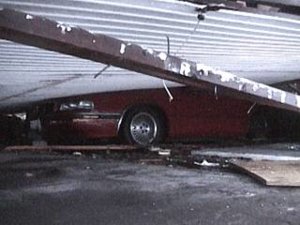
In a strong hurricane, you MUST be in a REINFORCED CONCRETE building such as a parking garage, prison / jail, hospital, etc. Check out what a strong category 4 storm did to this body shop above!
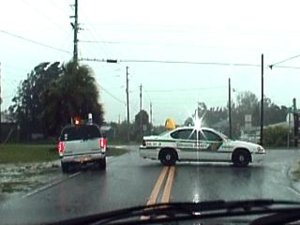
Being caught out on the streets during a curfew can land you in jail. I have seen this happen in hurricane Jeanne in 2004 when a person (who happened to be an innocent storm chaser from Nebraska) was wandering around during the storm, was not 100% honest with authorities, and was arrested. My group was up-front with the same police crew and he simply waved to us and said "good luck" as they hauled off the other person!
Do NOT lie to police to get past a road block, tell them WHO you are and WHAT you are doing. Equipment here on your vehicle also helps alot, I often get past roadblocks when they see my portable "weatherlab" station on the roof! Be HONEST, and if they say "No go", well sorry, then it's "No go"!
I heard stories where hurricane chasers said they were with the NWS or NOAA to authorities to get on a barrier island, and while "experiencing" the storm on the island, the authorities (already bored) checked their credentials and found out they are not true. When the storm chase party returned on that same road to get off the island, the same authorities picked them up and they were arrested.
View attachment 32f09a517003858b2c1bb3b21d99bef8.jpg
You must be SELF-SUFFICIENT. You can be stuck for a LONG time. Water, food, fuel, batteries, tools, medicine, first aid kit, supplies, even an extra spare tire, are all VERY important. You WILL need them. So PLAN!
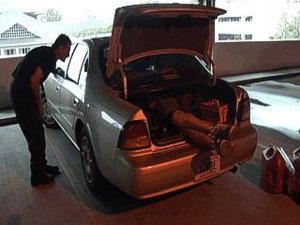
There is no AAA, 911 is ignored, and you are also ON YOUR OWN once the storm is on top of you. In the above picture, a fellow chaser had his vehicle running and the "auto safety" child lock engaged. Now, locked out of the vehicle, it took nearly an hour to break the trunk lock, cut through the back seat, and open the door from the inside. Imagine this happening to you alone and all your tools are inside your car. Even worse, imagine this happening with a rapidly rising storm surge and / or impending 130-MPH eyewall!
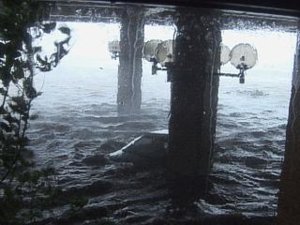
Ninety out of a hundered hurricane deaths are from drowning. Storm surge and flooding is a VERY bad thing. Imagine this car being your "ride" in a hurricane chase, with gear and equipment inside? Not cool. Avoid such "suprises" ... Consider a high place for you AND your vehicle if observing a storm surge at close range!
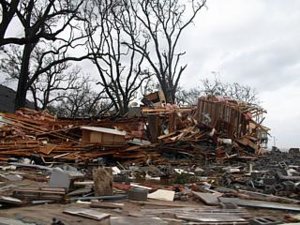
This is why you need to be in a REINFORCED CONCRETE structure observing a category 4 or 5 hurricane ... Imagine if you saw this picture for the first time - "Oh a tornado" would probably be your first thought.
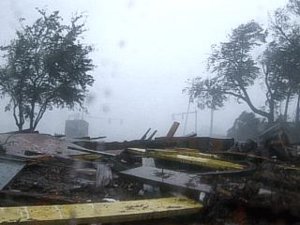
This is a roadway blocked by debris and storm surge. Even if you had a "big foot" or "land master" vehicle you could not pass this mess! You are stuck, and clearing roads when search and rescue operations are under way is usually NOT a top priority.
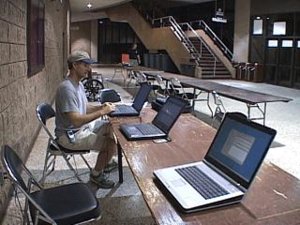
Here (above) is the lobby of the Biloxi Coliseum before hurricane Katrina and the storm surge.
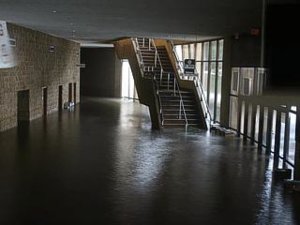
Here (above) is the lobby of the Biloxi Coliseum DURING hurricane Katrina and the storm surge. Any questions?
[Broken External Image]:http://www.jalopnik.com/cars/images/landmaster_vehicle.JPG
Maybe consider one of these vehicles for the next "Kartrina" like landfall at the beach ;-)
Thanks for all on any input to this thread!
And good luck of anyone taking up tropical cyclone (hurricane) chasing!
Anyone interested in hurricane chasing should read this write-up, especially during the onset of hurricane season.
Don't know what a hurricane is? You are not alone ... Many many people are not familiar with tropical weather, especially those far from the ocean shores. You can learn all you need to know about tropical cyclones by visiting my web page called "Anatomy Of A Tropical Cyclone" at the link below!
Link Is: http://www.sky-chaser.com/schurr.htm
I am making this post here with the idea that many members of this site are becoming more and more interested in hurricane chasing. With the violent storms of 2005, such as Katrina, Rita, and Wilma much interest was inspired in this special type of storm chasing, but I would also like to inform anyone of the pros and cons of hurricane chasing...
I am a pretty big hurricane chaser myself, one of the chasers that works severe weather in the US Plains come May / June then picks up on hurricane intercepts thereafter (busiest in September / October).
Let me first disclaim on hurricane chasing - These storms are MUCH different than their distant tornado and thunderstorm "in-laws" in the plains! Hurricane chasing requires extensive knowledge of tropical meteorology and VERY careful planning (in addition to any forecasting)!
Things to consider before I go on are below. I have to accept these risks and issues since I love to chase hurricanes and have to deal with them. Please read them and decide for yourself about considering a "career" in hurricane chasing...
1. A hurricane can have winds near or exceeding that of the core region of a significant tornado. A hurricane chaser must go THROUGH those dangerous winds. Hurricanes CANNOT be observed from a distance. An 80-MPH wind can knock you down. 120-MPH-plus winds can lift you clear off your feet and carry you through the air!
2. There are road closures / blockades and police checkpoints, even well before / after the storm. You are often turned away if you do not have the proper "credentials". If you lie about who you are, you will be arrested and / or questioned.
3. Curfews are often placed in hurricane disaster areas. If you violate (are simply on the roads) during a curfew and are caught by authorities, you WILL be arrested, no questions asked.
4. Roadblocks are not only caused by authorities. Trees fall, there is lots of debris, and roads flood in a hurricane. You can be trapped for a very, VERY long time. Flooding and storm surge could also block you in for a WHILE.
5. Gas stations are NOT open and / or will NOT have power. Storing gas in you car is also a VERY BAD idea. Low pressure in a hurricane can cause gas cans to leak with fumes and can even explode! There is NO roadside or emergency services during a hurricane (that means that if you get stuck and / or hurt, you are on your own)! Phone service, even cellular, often gets cut-off too.
6. Power often goes out in a hurricane. Stores are closed, most people leave the "hurricane target area". You must bring your own food, water, even medications (if any) with you for at least the duration of the chase, which can be 36-48 hours. Also remember, you cannot get gas if you run low!
7. Plan to not sleep during most of a hurricane chase. Don't fall asleep behind the wheel. Hotels are also CLOSED. If you do get any sleep, and are not kept awake by "adrenaline", you most likely will be "cat napping" in your car if you are lucky. Sound easy? Try staying awake for 52 hours straight - I did that in Hurricane Lili and was hallucinating until I finally got sleep!
8. Plan to get WET - Really wet. Cold and wet feet, shoes, pants, even in places you never imagined (the money in your wallet even gets soaked)! Your vehicle also can get very wet and it makes a nice smell after a chase! This water is no way "clean" either, it is FILTHY, but I will get to that subject down below. Plan on many changes of clothes, or even throwing clothes away altogether. Raincoats and umbrellas simply dont work and / or get ripped apart by the winds. Rain drops feel like accupuncture and can even cause welts on the skin at 100-MPH plus!
9. Gear, such as radios, electronics, and camera equipment can suffer water damage easily. This type of damage is often NOT covered by any warranty, and can be VERY expensive to replace or repair. Also, electronics and water don't mix, and your small 115 V invertor can be a DEADLY shock hazard if wet and / or touched with wet hands!
10. Coastal areas flood during a hurricane with fast-moving salt water. You can drown, have your vehicle flooded and / or swept away if parked in an area prone to storm surge. Not all buildings / structures can handle an hurricane and it's surge. Don't get buried under rubble!
11. There is a lot of flying debris in a hurricane. Remember, hurricane chasing involves being INSIDE the wind field of the "vortex" (larger than a tornado). A worst-case would be getting hit with a chunk of sheet metal and killed, not because of the wound it may cause, but failure to get attention to that wound (such as bleeding to death) - Remember, no fire department or 911 operates in a hurricane! You WILL be with yourself and your wound. Chase with a person with training in CPR and have a first aid kit handy in the event you need it (this implies using the "buddy system").
12. Flood waters in a hurricane are loaded with all kinds of nasty things. In addition to debris and mud / sand, you often have dead fish, seaweed, grass, bugs, oil and gas spilled from cars or boats, bacteria, even raw sewage. Watch for snakes and even gators flooded out of their "homes" too by the floods!
13. Looting and public upset often occur during and after a hurricane. Respect property and land areas as if it was an ordinary day. Uptight residents during a hurricane can and WILL take the law into their own hands! I have seen residents with guns with them in hurricane chases of 2004, and a "storm chaser" can easily be mistaken for a "thief" and shot. Looting has its own dangers as stealing and / or violence can be introduced into an already bad situation. Watch out for such "anarchy".
14. The boss, neighbors, and spouse. Hurricane chasing involves a last-minute "impromptu" chase. You cannot give a 3-day-off notice in most jobs one day before you take the time off! Make sure your boss, and even spouse, understands as you will not be gone for hours as on a tornado chase. Also, plan on being "cut off" from these people because of power / phone outages too. Hurricane chasing often takes DAYS, not HOURS.
15. Emotional and mental trauma. Prepare youself mentally for what you may experience since it may be really, REALLY ugly. Katrina taught me that very well, and made myself, a 35 year old grown man, cry for days and feel really sad. The footage was great, but the utter sympathy sets in ... as well as seeing houses, boats, debris, cars, even people floating by and / or being ripped apart "does things to you".
16. Mental and emotional "labeling" ... This is a really NASTY one, especially the "mental" aspect of it. I have LOST many relationships because of "hurricane chasing", the most recent one being after I showed "in-your-face" video of waves breaking over a seawall from a waterproof camera enclosure. I was called "crazy" and even worse "dumb" and "stupid". I was told that "storm chasing" is tolerable, but "hurricane chasing" is not due to the famous "you make me worry sick over you". Most of the time, do not expect to be in a happy relationship AND be an avid hurricane chaser AT THE SAME TIME! This is because the inherent danger in hurricane chasing is higher, and many people simply cannot accept that.
17. I have just visited a doctor in September 2005 for a persistant cough accompanied by severe night sweats, aches, and fevers. I was told it might be bronchitis or "walking" pneumonia ... Upon examination and diagnosis, I was given antibiotics and treated for "E Coli infection in my respiraratory tract". This was NOT a common cold, but nailed the cause to the WATER when I was chasing Katrina 2-3 weeks prior (8-29). Like I said, water and surge contains lots and lots of very BAD things in it (remember New Orleans?) ... And 130 MPH plus winds are going to whip up spray and you will un avoidably breathe it in ... Just another warning.
I willingly and logistically accepted all these risks and with planning and experience was able to chase hurricanes with minor incidences. Still want to chase a hurricane?
Check out these examples from 2004 and 2005...
Hurricane Katrina had a storm surge about 30 feet and winds gusting over 140 MPH ... See some examples of this below...
Katrina: http://www.sky-chaser.com/kat05.htm
I was also in hurricane Charley in 2004 first hand. This had winds gusting near 185 MPH ... read the story of what that was like below...
Charley: http://www.sky-chaser.com/char04.htm
Plus a compelling story about it here...
Charley Story: http://www.sky-chaser.com/charley_story.htm
Then there was Frances, Ivan, and Jeanne in the rest of 2004, each with their own attitude and aspects. I was also on Rita (most recently) as it brushed Key West. You can read about these on my website at these links below...
Frances: http://www.sky-chaser.com/franc04.htm
Ivan: http://www.sky-chaser.com/iv04.htm
Jeanne: http://www.sky-chaser.com/jean04.htm
Rita: http://www.sky-chaser.com/rit05.htm
Now, back to the thread on this wonderful subject ... I have explained in detail the DIFFERENCES between HURRICANE and SEVERE WEATHER chasing that a storm chaser considering chasing a hurricane must know.
The story can also be found on my web-site at http://www.sky-chaser.com/schcom.htm.
How bad can it get?
VERY BAD ... Let the pictures below illustrate the facts...

In a strong hurricane, you MUST be in a REINFORCED CONCRETE building such as a parking garage, prison / jail, hospital, etc. Check out what a strong category 4 storm did to this body shop above!

Being caught out on the streets during a curfew can land you in jail. I have seen this happen in hurricane Jeanne in 2004 when a person (who happened to be an innocent storm chaser from Nebraska) was wandering around during the storm, was not 100% honest with authorities, and was arrested. My group was up-front with the same police crew and he simply waved to us and said "good luck" as they hauled off the other person!
Do NOT lie to police to get past a road block, tell them WHO you are and WHAT you are doing. Equipment here on your vehicle also helps alot, I often get past roadblocks when they see my portable "weatherlab" station on the roof! Be HONEST, and if they say "No go", well sorry, then it's "No go"!
I heard stories where hurricane chasers said they were with the NWS or NOAA to authorities to get on a barrier island, and while "experiencing" the storm on the island, the authorities (already bored) checked their credentials and found out they are not true. When the storm chase party returned on that same road to get off the island, the same authorities picked them up and they were arrested.
View attachment 32f09a517003858b2c1bb3b21d99bef8.jpg
You must be SELF-SUFFICIENT. You can be stuck for a LONG time. Water, food, fuel, batteries, tools, medicine, first aid kit, supplies, even an extra spare tire, are all VERY important. You WILL need them. So PLAN!

There is no AAA, 911 is ignored, and you are also ON YOUR OWN once the storm is on top of you. In the above picture, a fellow chaser had his vehicle running and the "auto safety" child lock engaged. Now, locked out of the vehicle, it took nearly an hour to break the trunk lock, cut through the back seat, and open the door from the inside. Imagine this happening to you alone and all your tools are inside your car. Even worse, imagine this happening with a rapidly rising storm surge and / or impending 130-MPH eyewall!

Ninety out of a hundered hurricane deaths are from drowning. Storm surge and flooding is a VERY bad thing. Imagine this car being your "ride" in a hurricane chase, with gear and equipment inside? Not cool. Avoid such "suprises" ... Consider a high place for you AND your vehicle if observing a storm surge at close range!

This is why you need to be in a REINFORCED CONCRETE structure observing a category 4 or 5 hurricane ... Imagine if you saw this picture for the first time - "Oh a tornado" would probably be your first thought.

This is a roadway blocked by debris and storm surge. Even if you had a "big foot" or "land master" vehicle you could not pass this mess! You are stuck, and clearing roads when search and rescue operations are under way is usually NOT a top priority.

Here (above) is the lobby of the Biloxi Coliseum before hurricane Katrina and the storm surge.

Here (above) is the lobby of the Biloxi Coliseum DURING hurricane Katrina and the storm surge. Any questions?
[Broken External Image]:http://www.jalopnik.com/cars/images/landmaster_vehicle.JPG
Maybe consider one of these vehicles for the next "Kartrina" like landfall at the beach ;-)
Thanks for all on any input to this thread!
And good luck of anyone taking up tropical cyclone (hurricane) chasing!
